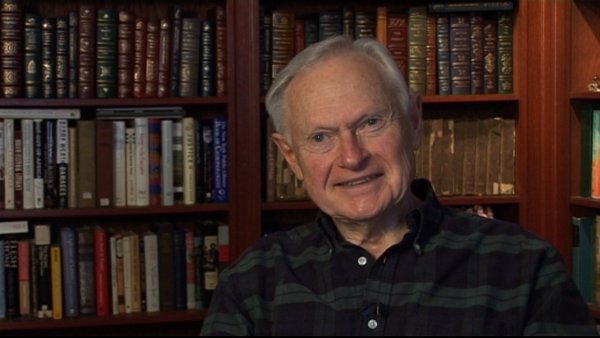NEXT STORY

Why people invented religion
RELATED STORIES

NEXT STORY

Why people invented religion
RELATED STORIES


|
Views | Duration | |
|---|---|---|---|
| 21. An original marriage proposal | 1 | 746 | 03:20 |
| 22. A Jew without belief | 1 | 542 | 02:09 |
| 23. Beneficial spirituality | 1 | 447 | 02:36 |
| 24. Human need for a sense of order | 1 | 462 | 04:14 |
| 25. Why people invented religion | 459 | 03:13 | |
| 26. A sense of wonder | 1 | 308 | 02:06 |
| 27. That narcissistic feeling | 1 | 344 | 00:34 |
| 28. Don't think, just write! | 2 | 413 | 02:34 |
| 29. I become a literary editor | 235 | 03:04 | |
| 30. Ignaz Semmelweis and hand-washing | 419 | 01:58 |


As I studied the human body in a much deeper sense, actually, than I ever had, in order to write this book, I had to do that, I developed the concept that our sensoria, our cerebral cortex is aware on a level deeper than the unconscious, to the rhythms of our bodies. When describing the animal cell, I made a point, in that particular chapter, of talking about the millions of biochemical reactions going on in each cell at any given time, and the absolute chaos of that. But in order not for the cell to be destroyed, there must be… some order to the entire thing. There must be a reason that cell survives amidst the chaos. And I found myself thinking of the old Greek concept of cosmos versus chaos. Cosmos is in the heavens, and to the Greeks, it looked perfect. Everything was always where it should be. As the seasons changed, you could predict what would be where, as opposed to the chaos on Earth, the chaos of human life.
And the more I thought about that, the more I thought of the idea that the chaos within the human cellular organism, and specifically within cells… because that chaos is there, the human animal… needs, looks for, searches for, yearns for, a sense of order. And that's what music is, and that's what poetry is. Why do we have poetry? When poetry rhymes or doesn't rhyme, it's in cadences, it's in repetitive form. Biblical poetry doesn't rhyme. Read the Psalms, read the Proverbs. It's the cadences. It's the repetitiveness. I'll grab examples from different areas. When you listen to the music that the kids dance to, what do you hear? You hear the heartbeat in the background. Every single piece of music that these kids listen to has the heartbeat in the background. If you listen for it, it's always there. Our heartbeat reassures us because it's a regularity amidst the chaos.
And I wrote about that, at least a chapter's worth, maybe more. I haven't looked at the book in a long time, but it's become a matter of virtual certainty to me, something that I can't prove with our present science, cannot even be studied, but that the human spirit, as I define it, is this sense of, and need for, order… and predictability. And this is what art is all about. Even the most abstract of art has a basic concept to it within the hands and the mind of the artist who created it. And that's true of the most abstract kind of music as well.
And I can read a piece of poetry in a literary journal, or something like the New York Book Review, or The New Yorker, and sometimes I say to myself, this isn't poetry, because it doesn't have that sense of symmetry and repetitiveness of thought. It doesn't have to be of words, it's of thought.
Sherwin Nuland (1930-2014) was an American surgeon and author who taught bioethics, the history of medicine, and medicine at the Yale University School of Medicine. He wrote the book How We Die which made The New York Times bestseller list and won the National Book Award. He also wrote about his own painful coming of age as a son of immigrants in Lost in America: A Journey with My Father. He used to write for The New Yorker, The New York Times, Time, and the New York Review of Books.
Title: Human need for a sense of order
Listeners: Christopher Sykes
Christopher Sykes is a London-based television producer and director who has made a number of documentary films for BBC TV, Channel 4 and PBS.
Tags: Bible, The New Yorker, New York Book Review
Duration: 4 minutes, 14 seconds
Date story recorded: January 2011
Date story went live: 04 November 2011